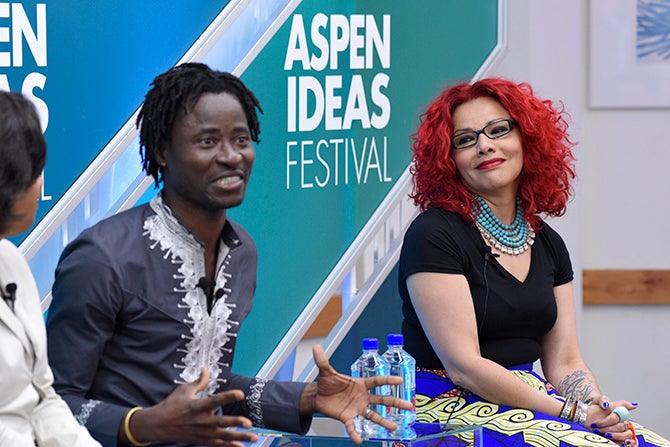The word is out that Spotlight Health is the health conference to attend. Last summer in Aspen, Colorado, participants, speakers, and experts spent three days talking the biggest ideas in the most innovative fields. Read, watch, and listen below for highlights.
Surgeon General Vivek Murthy talks curbing the opioid epidemic:
Over the past ten years, there has been an increase in opioid overdose rates, particularly since 2013. Addressing this epidemic has been a top priority of the Obama Administration, which proposed $1.1 billion in new funding to help Americans with an opioid-use disorder get the help they seek. In this session, US Agriculture Secretary Tom Vilsack and US Surgeon General Vivek Murthy discussed their work on the Administration’s interagency initiative to tackle the heroin and prescription opioid crisis in America.
“We have to change how our country sees addiction. People are scared to come forward and ask for help because they worry about the stigma that’s still associated with this illness. We have to change that. We have to help our country see that addiction is not a character flaw or a moral failing. It’s a chronic illness. It’s a disease of the brain. We have to treat it with the same skill, urgency, and compassion that we would treat diabetes or heart disease or cancer,” said Murthy.
What is gender?
Attitudes toward gender are a cultural signature. Women’s bodies and their dress are subject to ideological interpretations; the labels “man” and “woman” are increasingly recognized as a social, not a biological, construct; and the boundaries of self-identity have become fluid. Within and outside Muslim communities, a veiled woman is variously viewed as a symbol of subjugation, communal identity, political defiance, sexual repression, or personal freedom. Trans people are celebrating personal liberation in some quarters while enduring ridicule or punishment in others. How does gender define us? How do shifting attitudes towards gender influence health and development?

Bisi Alimi and Mona Eltahawy
“It’s shameful and challenging for people like us, who live in the reality of the battle we face in the 21st century, where I have to justify why I should stay in my country. I really want to contribute but I cannot – not because I have committed a crime, but because of my sexuality,” said Bisi Alimi, Nigerian activist, who says he has been banned from his home country of Nigeria due to his sexual identity.
Scaling lemonade stands
“Paper routes were the first job and business to many kids. Bill Gates, Benjamin Franklin, Mark Cuban, and Walt Disney were all paperboys when they were growing up. In 1980, there were over 1 million paper boys or girls in the US – that’s one million kids who really had their own small business. They would pay for the papers, collect payments, figure out how to deliver the most papers in the least amount of time, and hopefully get a nice Christmas bonus. Unfortunately, opportunities like this don’t exist for kids today. Kids can do so much more than they are given credit for. By having these experiences, kids can grow, gain confidence, social skills, and just have fun.” – Jack Bonneau

Jack Bonneau
Jack Bonneau is founder and CEO of Jack’s Stands & Marketplaces. He is ten years old and a fifth-grader in Northglenn, Colorado. Bonneau’s mission with Jack’s Stands, which he started in summer 2014, is to inspire and provide kids the opportunity to operate their own drink stands, sell their own products in real marketplaces, and have the same experiences he’s had in entrepreneurship, business, financial literacy, and life skills.
Should the FDA be an independent agency?
Six former Commissioners of the Food and Drug Administration (FDA) met to talk about an agency with wide-ranging regulatory responsibilities. FDA has authority over many foods and virtually all drugs, devices, cosmetics, veterinary products, and tobacco, giving it jurisdiction over one in every four dollars the American consumer spends. Does it have the resources and talent to do its job?
“It is a public agency, it is responsible for many things that affect public health, and yet this layering really dampens its ability to be responsive on many issues of importance in a timely fashion. All of those people may be there with sort of the intention of helping out more than overseeing, but that help often stands in the way of doing the right thing that the agency is expected to do. And I think having the agency as an independent agency keeps it accountable in a very visible way.” – Jane Henney, former commissioner of the FDA
Coming out in the spotlight
“When I was young, I didn’t even know the word transgender. I did everything to run away from it, literally. That worked for me for many years but it never went away. The internet changed the game. When I was a young person, there was no information out there. I was alone. Today, a young trans person can go on the internet and find out everything. The mental health of the trans community is by far the most difficult thing. I struggled with it all my life, but I had my ways of diversion – I had the Olympic Games, a tremendous family. But my life was a life of secrecy. For the last two years before I made the decision to transition, my life was absolute hell. Mentally, it was extraordinarily difficult. But I’m a strong person, mentally – there was only one time where I ever contemplated suicide, and it was probably at my low point. It was the beginning of a turning point: If the worst thing in my life is that I’m trans, I can handle it.” – Caitlyn Jenner, executive producer of I Am Cait
Waste not: Keeping good food out of the trash
Every year, one-third of all the food produced on the planet is lost or wasted, an amount valued at about one trillion dollars. If just 25 percent of that waste could be avoided, it would be enough to feed 870 million hungry people. Expiration dates that have no meaning to food safety, a reluctance to sell fruits and vegetables with cosmetic blemishes, and retail over-stocking all contribute to waste in wealthier nations, while spoilage, weather and pests are the primary culprits in poorer regions. How do we reduce waste? Can we find inventive uses for the food we salvage?
Tickets for Spotlight Health 2017 are available here.

